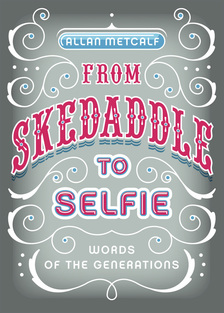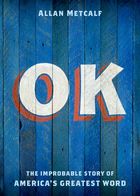Books about the English language

2019 (November 5) Nice Guys, Fall Guys, and the Guy they Set on Fire: The Legacy of Guy Fawkes (Oxford University Press). Throughout most of the United States, indeed much of the English-speaking world, when we gather in groups, we address the others as “guys” or “you guys.” It’s so normal that we scarcely notice how odd it is: a singular “guy” referring to males only, a plural “guys” encompassing the entire human race, and both taken from the name of England’s greatest villain.
The story begins more than 400 years ago when an admired English gentleman-soldier was recruited for his expertise in explosives by Catholic plotters against the protestant government. At the last moment he was seized as he prepared to light 36 barrels of gunpowder under the great hall of Parliament during its opening ceremony November 5. If the explosion had taken place, it would have killed everyone within: Lords, Commons, clergy, and royalty.
Interrogated that morning, he said he was “John Johnson.” If he had stuck with that pseudonym, we would have no “guys” today. But soon, encouraged by gentle torture, he admitted that he really was Guy Fawkes. That was the first Guy.
Parliament celebrated the providential escape by decreeing every November 5 a day of thanksgiving, with church services in the morning and bonfires at night.
How Guy became a guy; how that guy gradually became any male; how the loss of the pronoun “thou” gave “you guys” an opening to become the standard second person plural, and how today it has become both controversial yet nearly universal – this book tells all.
2016 From Skedaddle to Selfie: Words of the Generations (Oxford University Press).
Selfie, slacker, groovy, teenager—these are some of the distinctive words associated with the recent generations in American history. This book samples words of the different generations, going back as far as the American Revolution, with special attention to the differences in vocabulary among the generations currently living: the sometimes awkward Millennials, the grunge music of Generation X, hippies among the Boomers, bobbysoxers among the Silents, and many more. And skedaddle? That's what the Union Army did at the Battle of Bull Run back in 1861, a term belonging to the generation later called Gilded.
It has been proposed that each generation of those born within a particular time period of about 20 years can be identified and characterized by the words its members choose to use. And it seems to be true. Selfie, for example, goes with the Millennial generation, born in the 1980s and 1990s. Slackers come from Generation X, born in the 1960s and 1970s. Groovy was a way their predecessors, the Baby Boomers, expressed approval. And the Silent Generation (born 1925-42) were the first to be known as teenagers and to listen to rock and roll. As for the G.I. Generation (born 1901-24), they were swell, while their predecessors, the Lost Generation (born 1883-1900), were the first to be sexy.
The story begins more than 400 years ago when an admired English gentleman-soldier was recruited for his expertise in explosives by Catholic plotters against the protestant government. At the last moment he was seized as he prepared to light 36 barrels of gunpowder under the great hall of Parliament during its opening ceremony November 5. If the explosion had taken place, it would have killed everyone within: Lords, Commons, clergy, and royalty.
Interrogated that morning, he said he was “John Johnson.” If he had stuck with that pseudonym, we would have no “guys” today. But soon, encouraged by gentle torture, he admitted that he really was Guy Fawkes. That was the first Guy.
Parliament celebrated the providential escape by decreeing every November 5 a day of thanksgiving, with church services in the morning and bonfires at night.
How Guy became a guy; how that guy gradually became any male; how the loss of the pronoun “thou” gave “you guys” an opening to become the standard second person plural, and how today it has become both controversial yet nearly universal – this book tells all.
2016 From Skedaddle to Selfie: Words of the Generations (Oxford University Press).
Selfie, slacker, groovy, teenager—these are some of the distinctive words associated with the recent generations in American history. This book samples words of the different generations, going back as far as the American Revolution, with special attention to the differences in vocabulary among the generations currently living: the sometimes awkward Millennials, the grunge music of Generation X, hippies among the Boomers, bobbysoxers among the Silents, and many more. And skedaddle? That's what the Union Army did at the Battle of Bull Run back in 1861, a term belonging to the generation later called Gilded.
It has been proposed that each generation of those born within a particular time period of about 20 years can be identified and characterized by the words its members choose to use. And it seems to be true. Selfie, for example, goes with the Millennial generation, born in the 1980s and 1990s. Slackers come from Generation X, born in the 1960s and 1970s. Groovy was a way their predecessors, the Baby Boomers, expressed approval. And the Silent Generation (born 1925-42) were the first to be known as teenagers and to listen to rock and roll. As for the G.I. Generation (born 1901-24), they were swell, while their predecessors, the Lost Generation (born 1883-1900), were the first to be sexy.

2010. OK: The Improbable Story of America’s Greatest Word (Oxford University Press). From its humble beginning as a joke misspelling in the Boston Morning Post of March 23, 1839, to its present pervasiveness in languages around the world, and its expression of what could be called the American philosophy. Updated paperback edition, 2011. Chinese translation published by China Times Publishing Co., 2012.
Review by Roy Blount Jr. in New York Times Book Review, November 21, 2010.
Review by John Algeo in Dictionaries: Journal of the Dictionary Society of North America, 2011: “An impressively worthy biography, description, and analysis of what Metcalf calls ‘America’s greatest word.’ It is a book full of entertaining facts and intriguing interpretations about the American psyche, which the history of OK illuminates.”
2004. Presidential Voices: Speaking Styles from George Washington to George W. Bush (Houghton Mifflin). Presidential orators, communicators, blunderers, coiners of words; presidential accents; presidents depicted in movies and television; how to talk like a president. And then, for good measure, a short chapter on each president.
How should you talk if you’re president of the United States—or if you want to be? That is the question that motivated this book. What do Americans want from their president? Soaring oratory or plain speaking? Dignified or down-to-earth speech?
2002. Predicting New Words: The Secrets of Their Success (Houghton Mifflin). A survey of some successful and many unsuccessful coinages in English, leading to the conclusion that five factors influence whether a new word will find a permanent place in the vocabulary. The most surprising of these is Unobtrusiveness: Most new coinages that call attention to themselves never catch on.
2000. How We Talk: American Regional English Today (Houghton Mifflin). A region-by-region and state-by-state tour of the regional differences in vocabulary in the United States, as well as ethnic varieties.
1999. The World in So Many Words: A Country-by-Country Tour of the Words That Have Shaped Our Language (Houghton Mifflin). A round-the-world tour of English words adopted from well over a hundred other languages, everything from Welsh (“penguin”) to Basque (“bizarre”) to Arabic (“algebra”) to Nahuatl (“chocolate”).
1997. America in So Many Words: Words That Have Shaped America (with David K. Barnhart; Houghton Mifflin). One word made in America each year, beginning with the first English-speaking settlement of North America.
Books on writing:
2008. Writing to the Point. 6th edition. Roseville, MN: Birch Grove Publishing.
1995. Research to the Point. (Textbook on the research paper) 2nd edition. Harcourt Brace College Publishers, 1995.
Review by Roy Blount Jr. in New York Times Book Review, November 21, 2010.
Review by John Algeo in Dictionaries: Journal of the Dictionary Society of North America, 2011: “An impressively worthy biography, description, and analysis of what Metcalf calls ‘America’s greatest word.’ It is a book full of entertaining facts and intriguing interpretations about the American psyche, which the history of OK illuminates.”
2004. Presidential Voices: Speaking Styles from George Washington to George W. Bush (Houghton Mifflin). Presidential orators, communicators, blunderers, coiners of words; presidential accents; presidents depicted in movies and television; how to talk like a president. And then, for good measure, a short chapter on each president.
How should you talk if you’re president of the United States—or if you want to be? That is the question that motivated this book. What do Americans want from their president? Soaring oratory or plain speaking? Dignified or down-to-earth speech?
2002. Predicting New Words: The Secrets of Their Success (Houghton Mifflin). A survey of some successful and many unsuccessful coinages in English, leading to the conclusion that five factors influence whether a new word will find a permanent place in the vocabulary. The most surprising of these is Unobtrusiveness: Most new coinages that call attention to themselves never catch on.
2000. How We Talk: American Regional English Today (Houghton Mifflin). A region-by-region and state-by-state tour of the regional differences in vocabulary in the United States, as well as ethnic varieties.
1999. The World in So Many Words: A Country-by-Country Tour of the Words That Have Shaped Our Language (Houghton Mifflin). A round-the-world tour of English words adopted from well over a hundred other languages, everything from Welsh (“penguin”) to Basque (“bizarre”) to Arabic (“algebra”) to Nahuatl (“chocolate”).
1997. America in So Many Words: Words That Have Shaped America (with David K. Barnhart; Houghton Mifflin). One word made in America each year, beginning with the first English-speaking settlement of North America.
Books on writing:
2008. Writing to the Point. 6th edition. Roseville, MN: Birch Grove Publishing.
1995. Research to the Point. (Textbook on the research paper) 2nd edition. Harcourt Brace College Publishers, 1995.
